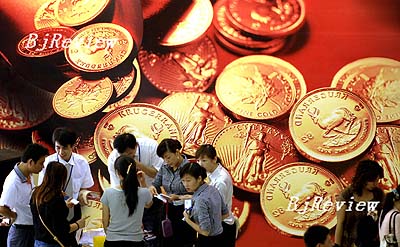|

Wealth management is in. Among the 100 million stock inventors in China, many are turning to the chic idea of managing their wealth.
A proposal by the government to encourage citizens to earn more "property income" has caught the attention of the population.
Chen Xiaolong, an official with the National Bureau of Statistics, explained that property income refers to earnings gained from assets including bank deposits, securities, real estate and other physical property, such as automobiles, antiques or luxury items.
Chen said that "per-capita disposable income," the index frequently used in modern statistics, is composed of four parts: salary income, income from transferable income (such as a pension), operational income (money earned from business operation), and property income.
In China, salary income usually accounts for 70 percent, while property income only averages around 2 percent. This means that the majority of people depend on salaries to support their families, though few have the intention to earn money through managing their assets.
"The proportion of property income is an important measurement of the wealth level of a country," said Chen. He said that in developed countries, per-capita property income is far higher than it is in China. Take the United States for instance. Property income accounts for 40 percent of all income and 90 percent of its citizens own securities such as stocks and funds. By comparison, at the end of the third quarter, the number of stock accounts in China totaled 120 million, while those holding fund accounts amounted to 90 million. The combined number of the two only accounts for 10 percent of the population. In the United States, over 50 percent of households invest in the stock market.
The report of the 17th National Congress of the Communist Party of China (CPC) made a strategic proposal to "create conditions so that the people can earn more property income." To be specific, this means the government will expand channels and provide more opportunities for ordinary citizens to earn property income.
"The new idea has aroused great interest," said Shang Fulin, Chairman of China Securities Regulatory Commission. "Property income involves all kinds of investments. The capital market is the most direct and vast place for earning such income. To actively improve the healthy development of the capital market will benefit investors and will be one of the key aspects of economic development."
Property management
To encourage property income, the first thing to do is to enable the people to "possess property." But property ownership largely depends on economic development. Since 2002, the Chinese economy has grown more than 10 percent annually. At the same time, the average development speed of the world was 4.9 percent.
Chinese citizens have accumulated more and more wealth. Figures from the central bank show that by the end of September, deposits totaled 17.2 trillion yuan ($2.3 trillion). Along with the burgeoning stock market, people's enthusiasm for investment has been rising.
Some individual investors have earned considerable wealth from the bullish stock market recently. According to the Asia Pacific Wealth Report jointly issued by Merrill Lynch and Capgemini on October 17, by the end of 2006, the financial assets of 498,000 people surpassed $1 million, up 9.21 percent from that of 2005.
The report said the strong performance of the Chinese economy and the bullish stock market were the factors contributing to the increase in the number of wealthy people in the country. In 2006, the market value of the Shanghai and Shenzhen stock markets surged 220.6 percent. The number of wealthy people is expected to increase as the market continues its bullish trend.
"It is impossible to increase property income for citizens just through substantial interest rate hikes," said Yin Jianfeng, a financial expert with the Chinese Academy of Social Sciences. "Therefore, the onus falls on developing the capital market." For example, Yin pointed out that the saving rate was around 5 percent in the United States, but the actual deposit proportion can reach 40 percent if the financial assets are also factored in. In China, this rate is around 30 percent.
| 